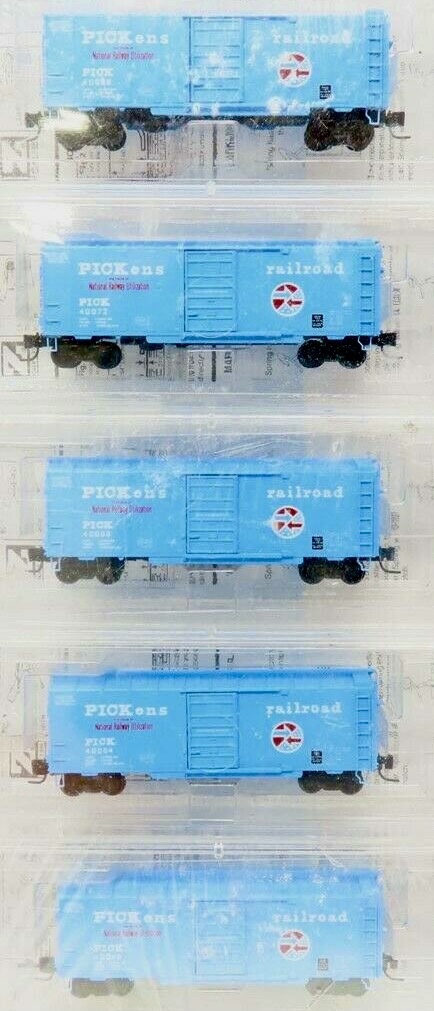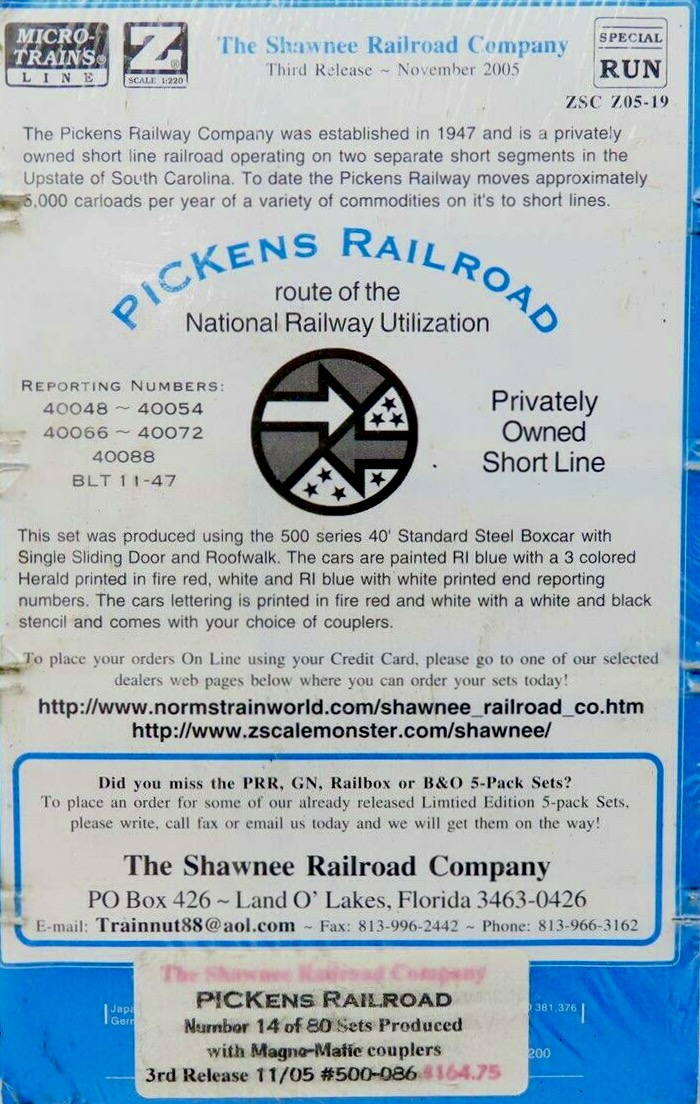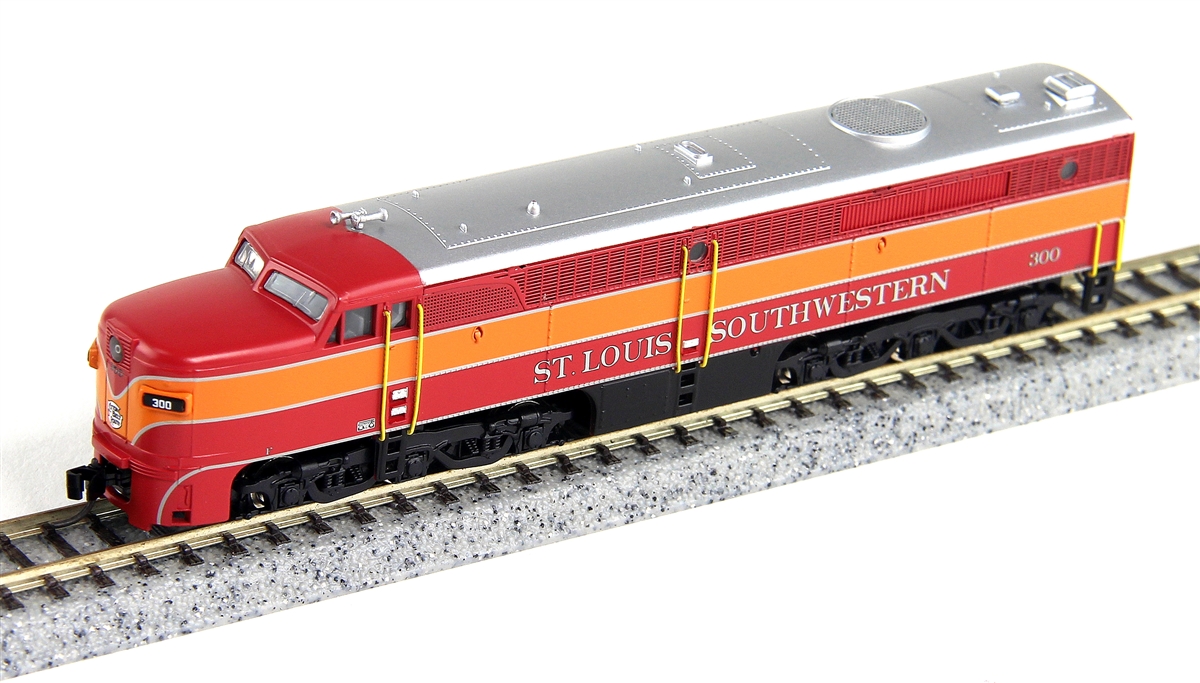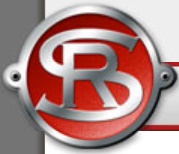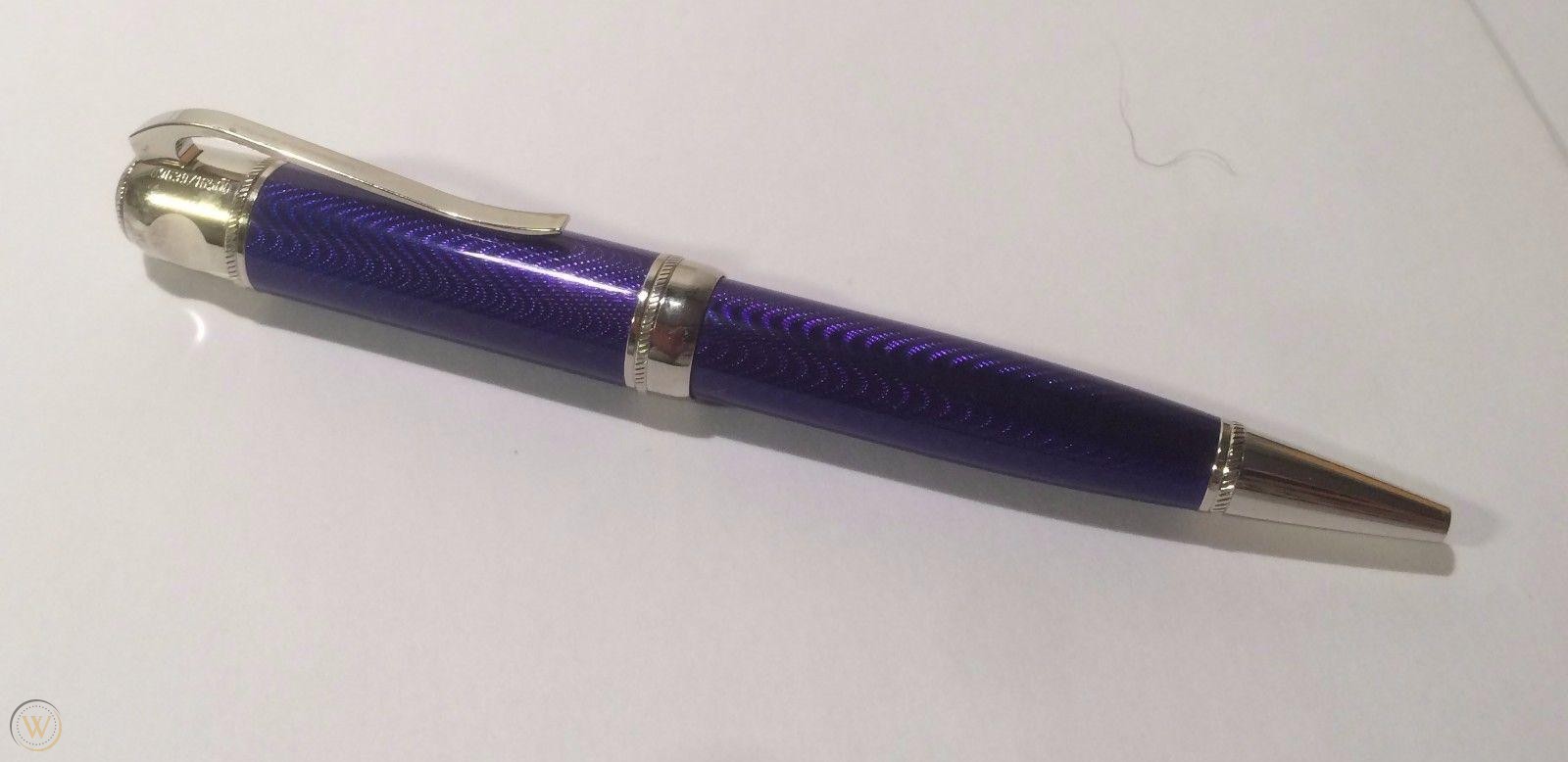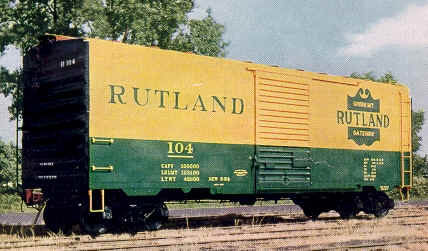Specific Item Information: Road Numbers: 40048 - 40054 - 40066- 40072 - 40088
Model Information: This is the Z-Scale version of the popular 020-series boxcar from the MTL N Scale line.
Prototype History: The 40' Boxcar is widely known as one of the most popular freight cars used by railroads as they transitioned from steam to diesel. In particular the Pullman Standard or PS-1 design was one of the most popular and was widely used by North American railroads. These boxcars were built beginning in 1947 and share the same basic design, with certain elements such as door size, door style or roof type varying among the different railroads and production years. When production of these cars ceased in 1963, over 100,000 had been produced.
So just what is a PS-1? Well the simple answer is it is any boxcar built by Pullman Standard from 1947 on. The design changed over the years – sometimes subtly, sometimes for customer request, and sometimes in a larger way. In general, most PS-1’s built from 1947 to 1961 share the same dimensions and basic construction techniques. These cars all had a length of 40′, a height of 10’5″ or 10’6″, welded sides and ends and roof of Pullman’s own design. The greatest variation was in the size and style of doors used. Pullman Standard also offered 50′ and later 60′ boxcars – also with the PS-1 designation.
So just what is a PS-1? Well the simple answer is it is any boxcar built by Pullman Standard from 1947 on. The design changed over the years – sometimes subtly, sometimes for customer request, and sometimes in a larger way. In general, most PS-1’s built from 1947 to 1961 share the same dimensions and basic construction techniques. These cars all had a length of 40′, a height of 10’5″ or 10’6″, welded sides and ends and roof of Pullman’s own design. The greatest variation was in the size and style of doors used. Pullman Standard also offered 50′ and later 60′ boxcars – also with the PS-1 designation.
Road Name History: The Easley-Pickens line was chartered on December 24, 1890, by the South Carolina General Assembly after two failed attempts to build a railroad through Pickens from Easley. The line connected with the Atlanta and Charlotte Air Line Railroad (later the Southern Railway) and was completed in 1898.
On the railroad's first revenue run, the Pickens Railroad suffered a serious derailment that was caused by a local group of boys that had placed spikes on the rails, in their words, "to see what would happen." No one was seriously injured, but caused the fledgling company a serious financial setback, which operated in the red until 1905.
In its early years, it was nicknamed the "Pickens Doodle" because the train would run backwards to Easley and forward to Pickens, which "looked like a doodlebug," according to area residents. The Pickens Railroad, at the time did not have turning facilities until the line built two wye sections of track at each end of the line years later.
The Southern Railway briefly acquired control of the Pickens around 1910, however, it was reverted to local interests several years later.
In the 1920s, Singer Manufacturing located a sewing machine cabinet plant on the Pickens Railroad. The plant eventually became the railroad's biggest customer and the line was purchased outright in 1939 by Singer. In 1927, the Appalachian Lumber Company built a network of logging lines in the upper portion of Pickens County. By 1939, it too was also acquired by Singer and organized under the Poinsett Lumber and Manufacturing Company. Passenger service was discontinued in 1928 as better roads were built in the region.
In 1959, The Singer Company consolidated its sawmill and cabinet operations with the woodworking operations from Arkansas and the Craftsman power tools from New Jersey to the Pickens location. In 1963, Poinsett Lumber and Manufacturing Company announced that the Pickens Railroad was for sale. James F. Jones of North Carolina purchased the line for approximately $50,000.[1] Jones built a new enginehouse and established a carshop for rebuilding and renovating railroad cars. Jones sold the Pickens in 1973 to Philadelphia-based National Railway Utilization Company (NRUC), which expanded the carshop to build new freight cars.
In the early 1990s NRUC became Emergent Group and sold the railroad to CLC-Chattahoochee Locomotive Corp., which renamed the railroad Pickens Railway Company, according to the Federal Register, 1 May 1996. On April 2, 2013, Pickens Railway pulled the last train to Easley because of lack of business. The final run was pulled by Pickens #9502 and CLCX #12132. The last train ended an era of over 100 years of running to Easley.
On the railroad's first revenue run, the Pickens Railroad suffered a serious derailment that was caused by a local group of boys that had placed spikes on the rails, in their words, "to see what would happen." No one was seriously injured, but caused the fledgling company a serious financial setback, which operated in the red until 1905.
In its early years, it was nicknamed the "Pickens Doodle" because the train would run backwards to Easley and forward to Pickens, which "looked like a doodlebug," according to area residents. The Pickens Railroad, at the time did not have turning facilities until the line built two wye sections of track at each end of the line years later.
The Southern Railway briefly acquired control of the Pickens around 1910, however, it was reverted to local interests several years later.
In the 1920s, Singer Manufacturing located a sewing machine cabinet plant on the Pickens Railroad. The plant eventually became the railroad's biggest customer and the line was purchased outright in 1939 by Singer. In 1927, the Appalachian Lumber Company built a network of logging lines in the upper portion of Pickens County. By 1939, it too was also acquired by Singer and organized under the Poinsett Lumber and Manufacturing Company. Passenger service was discontinued in 1928 as better roads were built in the region.
In 1959, The Singer Company consolidated its sawmill and cabinet operations with the woodworking operations from Arkansas and the Craftsman power tools from New Jersey to the Pickens location. In 1963, Poinsett Lumber and Manufacturing Company announced that the Pickens Railroad was for sale. James F. Jones of North Carolina purchased the line for approximately $50,000.[1] Jones built a new enginehouse and established a carshop for rebuilding and renovating railroad cars. Jones sold the Pickens in 1973 to Philadelphia-based National Railway Utilization Company (NRUC), which expanded the carshop to build new freight cars.
In the early 1990s NRUC became Emergent Group and sold the railroad to CLC-Chattahoochee Locomotive Corp., which renamed the railroad Pickens Railway Company, according to the Federal Register, 1 May 1996. On April 2, 2013, Pickens Railway pulled the last train to Easley because of lack of business. The final run was pulled by Pickens #9502 and CLCX #12132. The last train ended an era of over 100 years of running to Easley.
Brand/Importer Information: Micro-Trains Line split off from Kadee Quality Products in 1990. Kadee Quality Products originally got involved in N-Scale by producing a scaled-down version of their successful HO Magne-Matic knuckle coupler system. This coupler was superior to the ubiquitous 'Rapido' style coupler due to two primary factors: superior realistic appearance and the ability to automatically uncouple when stopped over a magnet embedded in a section of track. The success of these couplers in N-Scale quickly translated to the production of trucks, wheels and in 1972 a release of ready-to-run box cars.
Micro-Trains Line Co. split off from Kadee in 1990 to form a completely independent company. For this reason, products from this company can appear with labels from both enterprises. Due to the nature of production idiosyncrasies and various random factors, the rolling stock from Micro-Trains can have all sorts of interesting variations in both their packaging as well as the products themselves. When acquiring an MTL product it is very important to understand these important production variations that can greatly enhance (or decrease) the value of your purchase.
Micro-Trains Line Co. split off from Kadee in 1990 to form a completely independent company. For this reason, products from this company can appear with labels from both enterprises. Due to the nature of production idiosyncrasies and various random factors, the rolling stock from Micro-Trains can have all sorts of interesting variations in both their packaging as well as the products themselves. When acquiring an MTL product it is very important to understand these important production variations that can greatly enhance (or decrease) the value of your purchase.
Item created by: CNW400 on 2021-07-25 15:18:31
If you see errors or missing data in this entry, please feel free to log in and edit it. Anyone with a Gmail account can log in instantly.
If you see errors or missing data in this entry, please feel free to log in and edit it. Anyone with a Gmail account can log in instantly.


